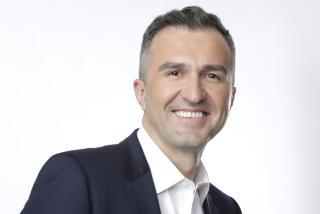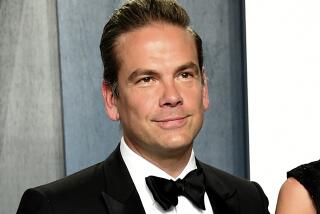Next Chief Inspires Optimism for BBC
- Share via
LONDON — Starting to climb out of a black hole after its traumatic battle with the government over Iraq war coverage, the British Broadcasting Corp. on Friday got an upbeat new chairman who pledged to “start looking forward” and put the BBC “back on track.”
Michael Grade, a swashbuckling, 61-year-old former broadcast executive who once served as the BBC’s programming director, struck a confident note at a news conference after his appointment was announced by the government.
“I think we have probably had enough apologies,” Grade said, referring to the mea culpa issued by BBC governors after a Jan. 28 report by Lord Justice Brian Hutton. The BBC was accused of making unfounded statements in reporting that the government had exaggerated the danger from Saddam Hussein’s Iraq.
The Hutton report, which concluded a lengthy judicial inquiry into the circumstances surrounding the suicide of British weapons scientist David Kelly, thrust the BBC into one of the worst crises of its history. BBC Chairman Gavyn Davies and Director-General Greg Dyke handed in their resignations.
Ill feeling persisted in the organization because many BBC journalists considered Hutton’s report a whitewash of the government’s actions and an unwarranted condemnation of the BBC as a whole.
Conservative critics in recent years have accused the BBC of being a liberal bastion, enslaved to political correctness. BBC loyalists, meanwhile, have feared that the BBC was in danger of losing its independence and prestige.
By putting a self-assured maverick with a strong resume in broadcasting and entertainment at the BBC’s helm, Prime Minister Tony Blair’s government probably has inoculated itself against any public perception that it was out to curb or tame the broadcaster, said Evening Standard columnist Norman Lebrecht.
“Excitable and sentimental, [Grade] will govern the BBC more by instinct than by science. Whatever Grade’s BBC will be, it will not be bland,” Lebrecht wrote Friday.
Grade, at a news conference, said he sees his challenge as building the BBC up, not engaging in more flagellation of an institution with 27,000 employees that permeates and unites Britain almost as much as the monarchy does. “My job is to tell everyone at the BBC that it is going to be fine,” he said.
As chairman, he added, he will shield the BBC from political pressure. Editorial independence is paramount, he said. “Without it, there is no point to the BBC.”
Grade, who began his career as a sportswriter and followed his father and uncle into the business, joined the BBC in 1986. As director of TV programming, he launched the popular soap opera “East Enders.” Later, he led Britain’s independent Channel 4 for nine years. At the time, he oversaw some programming that some people considered crude and racy, earning him the sobriquet of “pornographer in chief” from the Daily Mail tabloid.
Mediawatch-UK, an activist group that advocates decency in television content, said the appointment “beggars belief.” But Culture Minister Tessa Jowell said that because of Grade’s passion and creativity, he would be “a chairman the BBC can be truly proud of” and “the right man at the right time.”
Grade, who most recently was in charge of a lottery and a film company, is scheduled to assume his duties in May. At that time, the BBC governors will select a new director-general, who will be the hands-on chief executive of the organization.
More to Read
Sign up for Essential California
The most important California stories and recommendations in your inbox every morning.
You may occasionally receive promotional content from the Los Angeles Times.













